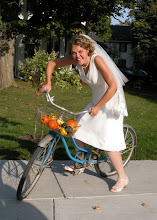My husband Rock discovered his call to be a builder while working on a Christian mission in New Guinea. He knew he didn't want to go to college, and the only option given to him was mission service. Within three months of arriving, three months of putting in a water system and working with his hands, he called home saying, "I think I've found what I want to do!". Rock says that he and his son Jake often look at one another at work and say, "Can you believe we get PAID to do this?"
The two of us coming together has made us both think a lot about what education is. I've been educated in a great deal of abstraction--concepts, words, theories. I've always felt cut off from the satisfactions he describes from being in the fresh air, using his body to put sticks and stones together into something useful, a safe shelter for a family.
We both feel a call to be with folks who recently entered "adulthood", but who have no idea how all of a sudden, on a birthday marking their 19th year of life, they can know "what they want to DO with their lives."
We believe there's a lot more to education than graduating in the top ten, rushing off to an expensive college, and getting that degree. We believe there's great value in spending a year learning about ourselves and working with our hands. We hope others will find this a compelling thing, and join with us.
And we're hardly the only ones thinking about this. More and more "gap year" programs are cropping up. With the recession, paired with shows like The Office and beloved Dilbert striking such a nerve with America's cubicle workers, it seems people are talking about the value of work all over the place.
We've been reading Matthew B. Crawford's book, Shop Class As Soucraft: An Inquiry into the Value of Work. He sums up much of what I'm talking about in this entry--it's a book "for those who feel hustled off to college, then to the cubicle, against their own natural bents..." (from the cover).
I'll finish with a poem by Marge Percy.
To be of use, by Marge Percy
The people I love the best
jump into work head first
without dallying in the shallows
and swim off with sure strokes almost out of sight.
They seem to become natives of that element,
the black sleek heads of seals
bouncing like half-submerged balls.
I love people who harness themselves, an ox to a heavy cart,
who pull like water buffalo, with massive patience,
who strin in the mud and the muck to move things forward,
who do what has to be done, again and again.
I want to be with people who submerge
in the task, who go into the fields to harvest
and work in a row and pass the bags along,
who are not parlor generals and field deserters
but move in a common rhythm
when the food must come in or the fire be put out.
The work of the world is common as mud.
Botched, it smears the hands, crumbles to dust.
But the thing worth doing well done
has a shape that satisfies, clean and evident.
Greek amphoras for wine or oil,
Hopi vases that held corn, are put in museums
but you know they were made to be used.
The pitcher cries for water ot carry
and a person for work that is real.
Thanks and credits to Marge Percy and Garrison Keillor for compiling such a great anthology of poems in Good Poems, Penguin Books, 2002, p. 157-8.

No comments:
Post a Comment